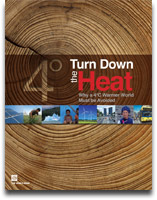
| Climate Reports Forecast Dire Climate Future | 23 November 12 |

As global warming approaches and exceeds 2-degrees Celsius, there is a risk of triggering nonlinear tipping elements. Examples include the disintegration of the West Antarctic ice sheet leading to more rapid sea-level rise, or large-scale Amazon dieback drastically affecting ecosystems, rivers, agriculture, energy production, and livelihoods. Atmospheric levels of carbon dioxide are at an all-time high and are projected to continue booming. Many scientists feel global warming of 2 degrees or greater is inevitable. Internationally renowned business firm Pricewaterhouse Coopers, issued a report, titled "Too Late for Two Degrees?." The report suggested that current efforts to reduce the carbon intensity, or the amount of emissions per unit of GDP, are unfolding so slowly as to be negligible. The Paris-based International Energy Agency (IEA), suggested in its annual World Energy Outlook that even accounting for the policy commitments already made or contemplated by world governments, energy-related emissions are expected to continue to rise over the next two decades, pointing to a "long‐term average temperature increase of 3.6 degrees Celsius. A World Bank report entitled, "Turn Down the Heat: Why a 4°c Warmer World Must Be Avoided", suggests that the climate could warm a full 4 degrees by the end of the century even if countries fulfill the modest emissions-reduction pledges they've already made. "Lack of action on climate change threatens to make the world our children inherit a completely different world than we are living in today," said World Bank Group President Jim Yong Kim. "It is still possible to avoid 2-degree warming, and arguing it is too late could very easily be a self-fulfilling prophecy," said Michael E. Mann, a climatologist and director of the Earth System Science Center at Pennsylvania State University. "That having been said, the real issue is whether or not we have the political will." "It would take an incredible effort, but that's what we're trying to spur," said author and activist from 350.org Bill McKibben, "Given the damage that 1 degree is doing, we're already at 'dire,'" McKibben said. "We dearly don't want to see what 2 degrees looks like, much less 3." View November 21, 2012 Huffington Post coverageView November 18, 2012 World Bank report View November 12, 2012 International Energy Agency (IEA) report View November 1, 2012 Pricewaterhouse Coopers report Sources:
Huffington Post
|
|
 Print version Print version |
Top |
